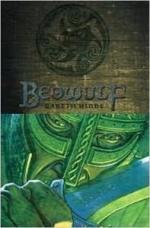{Giving liberally is the true proof of kingship.}
Was
frequently referred to: a folk-king indeed that
Everyway
blameless, till age did debar him
70 The joys
of his might, which hath many oft injured.
[1] For ‘geworhte,’
the crux of this passage, B. proposes ‘geþohte,’
rendering: I know
this people with firm thought every way blameless
towards foe and friends.
[2] S. and B. emend so as to negative the verb ‘meet.’ “Why should Hrothgar weep if he expects to meet Beowulf again?” both these scholars ask. But the weeping is mentioned before the ‘expectations’: the tears may have been due to many emotions, especially gratitude, struggling for expression.
XXVIII.
THE HOMEWARD JOURNEY.—THE TWO QUEENS.
Then
the band of very valiant retainers
Came
to the current; they were clad all in armor,
{The coast-guard again.}
In
link-woven burnies. The land-warder noticed
The
return of the earlmen, as he erstwhile had seen them;
5
Nowise with insult he greeted the strangers
From
the naze of the cliff, but rode on to meet them;
Said
the bright-armored visitors[1] vesselward traveled
[65] Welcome to Weders. The wide-bosomed
craft then
Lay
on the sand, laden with armor,
10 With
horses and jewels, the ring-stemmed sailer:
The
mast uptowered o’er the treasure of Hrothgar.
{Beowulf gives the guard a handsome sword.}
To
the boat-ward a gold-bound brand he presented,
That
he was afterwards honored on the ale-bench more highly
As
the heirloom’s owner. [2]Set he out on his vessel,
15 To drive
on the deep, Dane-country left he.
Along
by the mast then a sea-garment fluttered,
A
rope-fastened sail. The sea-boat resounded,
The
wind o’er the waters the wave-floater nowise
Kept
from its journey; the sea-goer traveled,
20 The foamy-necked
floated forth o’er the currents,
The
well-fashioned vessel o’er the ways of the ocean,
{The Geats see their own land again.}
Till
they came within sight of the cliffs of the Geatmen,
The
well-known headlands. The wave-goer hastened
Driven
by breezes, stood on the shore.
{The port-warden is anxiously looking for them.}
25 Prompt
at the ocean, the port-ward was ready,
Who
long in the past outlooked in the distance,[3]
At
water’s-edge waiting well-loved heroes;
He
bound to the bank then the broad-bosomed vessel
Fast
in its fetters, lest the force of the waters
30 Should
be able to injure the ocean-wood winsome.




